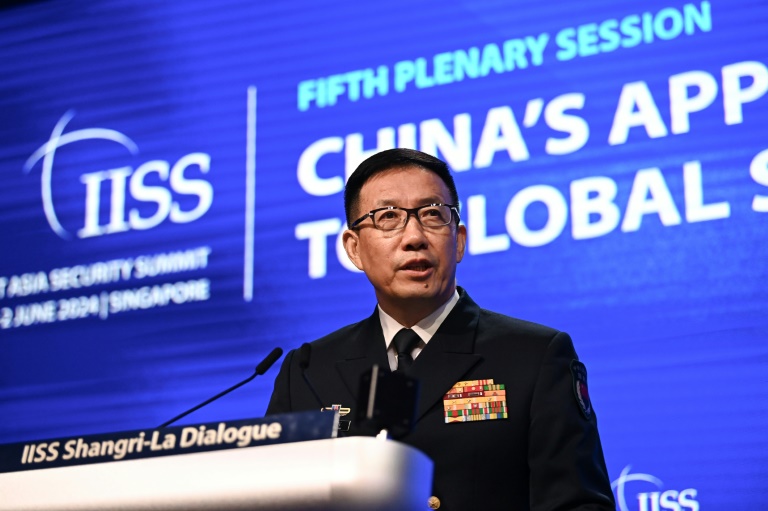Chinese Defense Minister Dong Jun warned on Sunday that his country’s military was ready to “forcefully” prevent Taiwan independence, but called for greater exchanges with the United States.
The remarks were made at an annual security forum in Singapore following the first substantive face-to-face meeting between the two countries’ defence chiefs in 18 months.
“We are always open to exchanges and cooperation, but this requires compromise from both sides,” Dong said during the Shangri-La Dialogue, where he met with U.S. Defense Secretary Lloyd Austin on Friday.
“I believe that because of the differences between the two armies, more exchanges are necessary.”
Mr Dong and Mr Austin met for more than an hour at a luxury hotel hosting the forum, which is attended by defense officials from around the world and has in recent years been seen as a barometer of U.S.-China relations.
After the meeting, Austin said calls between U.S. and Chinese military commanders would resume “in the coming months,” while China welcomed that security ties between the two countries were “stabilizing.”
This year’s Shangri-La Dialogue comes a week after China conducted military drills around Taiwan and warned of a U.S.-backed war over the island following the inauguration of President Lai Ching-te, whom Beijing describes as a “dangerous separatist.”
“The People’s Liberation Army will always be an indestructible and powerful military to safeguard the unity of the motherland, and will always act resolutely and forcefully to thwart Taiwan independence and ensure that the attempt never succeeds,” Dong told the forum on Sunday.
“Anyone who tries to separate Taiwan from China will be crushed to pieces and will destroy themselves.”
Taipei hit back, calling remarks by Chinese officials at the forum “irrational” and insisting it would “continue to work tirelessly for peace and stability in the Taiwan Strait,” according to a statement from Taiwan’s Presidential Office.
Regarding the South China Sea, where China claims almost the entire area and has been involved in clashes with Philippine ships, Dong warned that Beijing’s restraint has “limits”.
“China maintains sufficient restraint against human rights violations and provocations, but there are limits,” Dong said.
– The ignition of a conflict –
President Joe Biden’s administration and China have stepped up communications to ease friction between the nuclear-armed rivals, with Secretary of State Antony Blinken visiting Beijing and Shanghai last month.
A key focus has been on resuming dialogue between the armies, which is seen as essential to prevent the flaring conflict from getting out of control.
China suspended military communications with the United States in 2022 following then-Speaker of the House of Representatives Nancy Pelosi’s visit to Taiwan.
Issues such as an alleged Chinese spy balloon being shot down in US airspace, a meeting between then-Taiwanese President Tsai Ing-wen and Pelosi’s successor Kevin McCarthy, and US military aid to Taipei further escalated tensions between Washington and Beijing.
China is also infuriated by U.S. strengthening defense ties in the Asia-Pacific region, particularly with the Philippines, and by the regular deployment of warships and fighter jets to the Taiwan Strait and South China Sea.
Beijing sees this as part of a decades-old U.S. effort to contain it.
The two countries agreed to resume high-level military consultations, including on military operations in Taiwan, waters near Japan, and the South China Sea, following a summit between Chinese President Xi Jinping and President Biden in November last year.
AM/CWL/TYM/DHW

